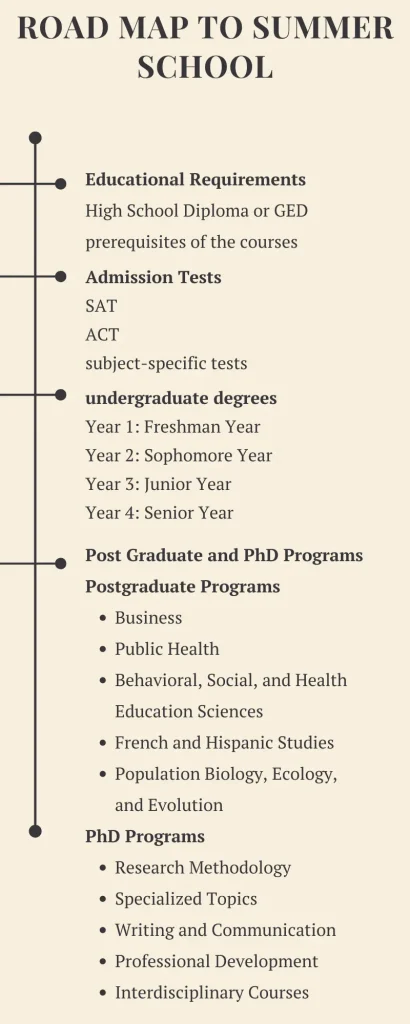How Long is Summer School
This question “How Long is Summer School” often arises as students and parents plan their academic year. Understanding the duration and structure of summer school can help in making informed decisions about enrolling in these programs, which offer a unique opportunity to advance one’s education during the summer months.
What is Summer School?
Summer school is an academic session offered by educational institutions during the summer break. It provides students with the chance to take additional courses, either to catch up on credits, get ahead in their studies, or explore new areas of interest. These programs are available for various academic levels, including pre-college, undergraduate, and graduate students.

Offered by prestigious universities and colleges, summer school programs are designed to be intensive and immersive, allowing students to complete courses in a shorter time frame compared to the regular academic year. This format can be highly beneficial for students looking to accelerate their academic progress or for those who need to meet specific degree requirements.
How Long is Summer School?
The duration of summer school can vary significantly depending on the institution and the specific program. Typically, summer school sessions range from 5 to 10 weeks. For example, at Johns Hopkins University, on-campus courses run for 5 weeks, while online courses can last between 5 to 10 weeks. Similarly, Stanford University condenses a typical 10-week term into an 8-week summer session.
Undergraduate Programs
Freshman Year
For incoming undergraduate students, summer school offers foundational courses that are crucial for building a strong academic base. These courses often include introductory classes in subjects like mathematics, science, and humanities. The sessions, which last between 5 to 10 weeks, provide a head start on college-level coursework, helping students to ease into the rigorous academic environment.
Sophomore Year
During the sophomore year, students might take advantage of summer school to fulfill core curriculum requirements or to delve into more specialized areas of their major. Courses during this period often include intermediate-level subjects that build on the knowledge gained during the freshman year. The duration remains consistent, typically ranging from 5 to 10 weeks depending on the institution.
Junior Year
For juniors, summer school can be an opportunity to focus on advanced courses that are essential for their major. These courses might include upper-division classes that are prerequisites for senior-year capstone projects or internships. The intensive nature of the 5 to 10-week sessions allows students to concentrate on fewer courses, providing a deeper understanding of the subject matter.
Senior Year
Senior students often use summer school to complete any remaining degree requirements or to engage in research projects and internships. These programs can be crucial for students who need to meet graduation timelines. The sessions continue to be intensive, lasting from 5 to 10 weeks, and provide a final push towards completing their undergraduate education.

How to Enter Summer School
Educational Requirements
To enroll in summer school, students typically need to meet the educational prerequisites of the courses they wish to take. For undergraduate programs, this usually means having completed the necessary high school coursework or having the equivalent of a high school diploma. Specific courses might also have prerequisite requirements that students must fulfill.
Entry Tests
Some summer school programs, especially those at prestigious universities, may require standardized test scores such as the SAT or ACT. Additionally, for courses that are highly specialized or advanced, institutions might require subject-specific tests to ensure that students are adequately prepared for the coursework.
Application Process
The application process for summer school generally involves several steps:
- Submit an Application: Fill out an online application form on the institution’s summer school website.
- Provide Transcripts: Submit official transcripts from high school or current college.
- Personal Statement: Write a personal statement or essay explaining why you want to attend summer school and how it fits into your academic goals.
- Letters of Recommendation: Some programs may require letters of recommendation from teachers or academic advisors.
- Application Fee: Pay any required application fees.
Financial Aids
Financial aid options for summer school can include scholarships, grants, and loans. Many institutions have specific financial aid programs for summer sessions. For example, Johns Hopkins University offers various financial assistance options to help students manage the costs associated with summer school. Students are encouraged to contact the financial aid office of the institution they are interested in to explore available options.
Post Graduate and PhD Programs
Specializations for Postgraduate Programs
Business: Many institutions offer specialized summer programs in business fields, such as accounting, finance, marketing, and management. For example, Goizueta Business School provides opportunities to pursue a degree in these areas with a focus on interaction between students and faculty .
Public Health: Programs like the Master of Public Health at Rollins School of Public Health explore the impacts of human behavior and sociocultural contexts on population health.
Behavioral, Social, and Health Education Sciences: PhD programs in these fields apply an interdisciplinary approach to research with a focus on ecological perspectives .
French and Hispanic Studies: Graduate programs in these areas provide a sophisticated and interdisciplinary approach to understanding cultural texts and contexts .
Population Biology, Ecology, and Evolution: These programs focus on bioinformatics, species interactions, disease ecology, and more, offering a diverse and intimate learning environment.
PhD Summer School Programs
Research Methodology
Advanced qualitative and quantitative research methods
Data analysis techniques
Experimental design and implementation
Specialized Topics
Courses focused on specific areas within your field of study
Advanced topics in your discipline
Emerging trends and technologies
Writing and Communication
Academic writing and publishing
Grant writing and funding applications
Presentation skills and public speaking
Professional Development
Career planning and development
Teaching and pedagogy
Ethics and responsible conduct in research
Interdisciplinary Courses
Courses that bridge multiple disciplines
Collaborative research projects
Case studies and real-world applications
Top 10 Summer Schools

Harvard University – Graduate School of Arts and Sciences Summer School
Offers diverse courses across multiple disciplines.
Emphasis on advanced research skills and methodologies.
Stanford University – Stanford Summer Session
Provides courses in a wide range of fields.
Opportunities for cutting-edge research and collaboration.
London School of Economics (LSE) – Summer School
Specialized courses in social sciences, economics, and political science.
Focus on research methodologies and data analysis.
ETH Zurich – Summer Schools
Courses in STEM fields with an interdisciplinary approach.
Strong emphasis on research and practical applications.
European University Institute – Summer School on Methods and Techniques
Focus on research methods in social sciences and humanities.
Hands-on workshops and training sessions.
University of California, Berkeley – Summer Sessions
Wide range of courses across various disciplines.
Opportunities for research and interdisciplinary collaboration.
University of Oxford – Oxford Summer School for Graduate Students
Courses in humanities, social sciences, and natural sciences.
Intensive research and writing workshops.
Massachusetts Institute of Technology (MIT) – Professional Education Summer Programs
Advanced courses in engineering, technology, and innovation.
Emphasis on research, development, and practical applications.
University of Cambridge – International Summer Programmes
Offers courses in various fields, including literature, science, and history.
Focus on advanced research and academic development.
Columbia University – Summer Sessions
Courses in a broad range of disciplines.
Opportunities for intensive research projects and academic growth.
Factors Affecting the Length of Summer School
Institution Policies: Different universities have varying policies on the duration of summer sessions.
Course Requirements: The complexity and credit requirements of the course can influence the length.
Delivery Mode: Online courses may have different durations compared to on-campus courses.
Subject Matter: More intensive or specialized subjects might require longer sessions.
Student Needs: Programs tailored to meet specific academic or personal development needs can vary in length.
Final Verdict
Understanding how long is summer school is crucial for students planning to make the most of their summer break. The duration can vary from 5 to 10 weeks, depending on the institution and program. Whether you are looking to catch up on credits, get ahead, or explore new academic interests, summer school offers a valuable opportunity to advance your education.
FAQs
1. How long is a typical summer school session?
Typical summer school sessions range from 5 to 10 weeks, depending on the institution and the program.
2. Can I take summer school classes online?
Yes, many institutions offer online summer school classes, providing flexibility for students who cannot attend on-campus sessions.
3. What are the entry requirements for summer school?
Entry requirements vary by institution but generally include having completed the necessary high school coursework or being enrolled in an undergraduate program. Some courses may have specific prerequisites.
4. Is financial aid available for summer school?
Many institutions offer financial aid options for summer school, including scholarships, grants, and loans. It’s best to contact the financial aid office of the institution for specific information.
5. What types of courses are offered in summer school?
Summer school courses range from introductory to advanced levels across various disciplines, including humanities, sciences, business, and more. Institutions like Harvard and Stanford offer a wide array of courses to choose from
